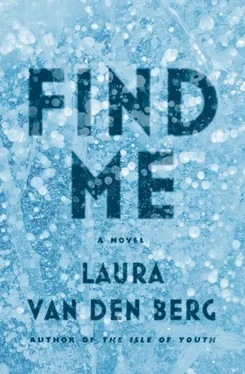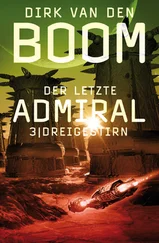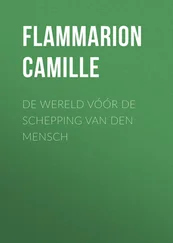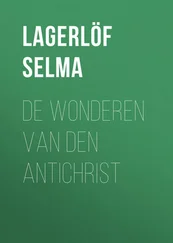The patients glance at the Common Room window with nervous eyes. Through the bars the sky looks like black paint being mixed around in a can.
In Massachusetts, I have seen snow that falls as heavy as a driving rain and drifts as tall as me. I have seen winds that shred power lines and uproot trees. I think I am prepared.
Dr. Bek asks if we have questions. Hands grab at the air.
“Are we going to die?” a patient from Floor Group three calls out.
He blinks rapidly, like he has something in his eye. “No one is going to die,” he says.
* * *
We lose power in the middle of dinner. The lights flicker and flicker and then go out. We sit in darkness, our trays in front of us, our food growing cold, and listen to the windows rattle behind the bars. We hear a humming and the lights come back on, but they are not the lights we are used to. They are a dull gold and they shine out from the corners, so some tables are trapped in a bubble of light, others shadowed.
We finish our dinner, our fingers moving dumbly in the partial light. I wrap my fist around a plastic fork and poke at a kidney-shaped piece of chicken. I can hear the staff breathing on the borders of the room. Floor Groups four and six leave their tables and begin collecting trays. Our table is cloaked in shadow, so they forget all about us. After dinner, the patients stay where they are, afraid to leave the enclosure of the Dining Hall. The faces around me are dark glimmers.
I’m sitting across from the twins. They have started a word association game, where they take turns calling out things that have to do with Hawaii. This is the memory trick Dr. Bek has invented for them. Whoever can keep it up the longest wins.
“Magma!”
“Lokelani!”
“Sugarcane!”
“What does the winner get, anyway?” I ask after Christopher wins for the fourth time in a row, clearly in no danger of forgetting.
“The distinction of having superior knowledge,” he says.
I hear the clank of a tray falling. Somewhere in the Dining Hall a patient is laughing. On the speakers, the Pathologist is making a sound that reminds me of the ocean noises on the video I watched at the museum.
What was I really looking for that day?
I overhear Olds say that when she was growing up in Michigan, they called weather events like this “silver storms.” I let that phrase linger with me. I imagine icicles hanging like tentacles from power lines and trees.
* * *
Once a thunderstorm knocked out power at the Stop & Shop. An emergency generator switched on, but the electronic lock on the manager’s office failed. A cashier went in and stole the manager’s computer and never came back to the store. If only that had been my shift. In the Dining Hall, I start to get ideas.
No one notices when I slip away from my Floor Group, into the cold hall. Faint lights run along the sides of the ceiling. My footsteps sound like falling rain. I’m halfway to the stairwell when I hear a scream spill out of the Dining Hall. I am afraid of what patients might become willing to do in the near dark.
An incomplete list of things that make patients scream in the Hospital: nightmares, needles, bad memories, fear of death, homesickness, rules, rage, boredom, lack of sunlight, each other.
In the stairwell, I go down five flights of stairs, all the way to the basement, the zero floor, where the air is frigid and damp and I can hear the storm whirring. I dart around a corner and down another hallway, lit by floodlights. I pat the walls, the cold stinging my palms, and search for the storage room door. I think about how my life before the Hospital prepared me for dark underground moments like this. Consider the pattern of transferring T lines: through a narrow tunnel, up stairs, down stairs, through another narrow tunnel, all of it done underground, the thumping sound of footsteps above, the walls vibrating from passing trains. Consider the journey through the dark of my basement apartment, from bed to toilet and back again, in the middle of the night. The graveyard shift at the Stop & Shop. The city was training me and I had no idea.
In the storage room, the keypad is dark. I lean on the door and it gives. Inside, the generator lights are a sickly yellow. Metal shelves are built into the walls; each shelf holds a row of gray rubber tubs. Every patient has a tub, their last name written across the bottom in black marker, the letters large and blocky. I try to un-see the names of the patients who have died.
Inside my tub I find my jeans and my black sweatshirt, all neatly folded. Three crumpled twenties are still a wad inside the front pocket. I press my sweatshirt against my mouth. It smells like the outdoors. I imagine my clothes have feelings and are glad to see me.
I lift out the sneakers and reach for the plastic baggie beneath. The photo is just like I remembered. The thin white blouse, the sliver of blue visible over her shoulder.
Since finding my mother there have been moments where I’ve doubted my own memory, my own sight. There have been moments where I’ve worried the woman on TV might not be my mother at all, but a careful copy, designed to trick me. The photo, my proof of her, is the only way to be sure.
The dark gloss of her hair is just the same. So is the teardrop shape of her cheekbones, the hard lines of her jaw. Her eyes. There is something slightly different about the angle of her nose. Her skin has paled with age. These alterations are to be expected: the body shows the impressions of time.
“Beatrice,” I say, touching her lips.
I tuck the photo into the waistband of my scrubs. I fold up my clothes, slide the tub back on the shelf. I leave the cold of the basement and go up and up, back to the fifth floor, the muscles in my thighs pulsing. The Dining Hall is still full. The patients are still sitting at their tables. On my way back to my Floor Group, I step in something wet. I brush against the shadowed body of a patient. Fingers skate across the small of my back. In one corner of the Dining Hall, I catch a white hazmat trudging through a wedge of light. A nurse, though I can’t tell which one.
I sit down at my Floor Group table, where the twins are still playing their word association game. I rub my thighs. I squeeze out the soreness. My breathing slows. I feel alive with secrets.
“A hui hou,” Christopher says. “I win again.”
* * *
It takes twenty-four hours for the power to come back on, for the Hospital to return to being warm and fluorescent, for the Internet to be restored. The TV service is a different matter.
In a Community Meeting, Dr. Bek explains that a power line fell during the storm. He clicks on the TV to demonstrate and the screen pops with static. He turns up the volume, so we can hear the buzzing, so it has a chance to dig inside our brains. The nurses are clustered by the window. The patients crouch, wanting to get away from the sound. They shut their eyes and scratch at their ears.
“How long will it be out?” I shout over the static, not wanting to see these gray worming lines on the screen but my mother’s face.
Dr. Bek doesn’t say anything. He doesn’t lower the volume. He just stands there in his suit and watches his patients kneel on the floor. He watches them tuck their heads under their arms or between their knees, trying to escape the noise. If a stranger appeared in the doorway, I wonder if it would look like we were engaged in some peculiar form of prayer.
* * *
I use my next Internet Session to research my mother. I tell myself that I am working on a very special project, that I, like Dr. Bek, need all the data I can get. She is famous enough to have her own Wikipedia entry, which says she was born in 1968, in Nova Scotia, and raised in Belfast, Maine, where her parents owned a seafood restaurant. She went to college in Connecticut and was a champion swimmer. There’s a photo of her in a bathing suit, hair slicked back, medals heaped around her neck. Water is beading on her chin. Her lips are pale, her pupils wide and dark. She is not smiling. She has been once married and once divorced. I don’t see anything more about family.
Читать дальше












